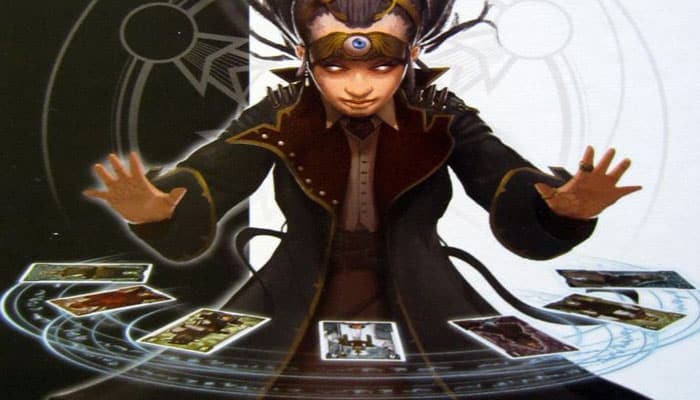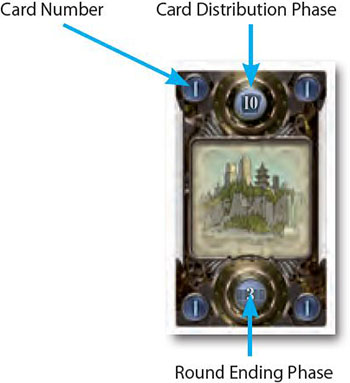
The game takes place in a uchronic and politico-steampunk universe, rooted in the lands of 10th-century Great Korea.

Components
- 45 Character cards of 9 different Families
- 10 Event cards
- 8 Season cards
- 8 Victory Point tokens
- 1 1st Player token
- Rulebook
Object of the Game
In Koryo, players will play Character and Event cards during 8 turns so as to build their influence with the nine governing political Families. At the end of the game, the player has gained the greatest influence wins the game.
Setup
Shuffle the 45 Character cards with the 10 event cards and place the cards in a pile, face down, at the center fhj table.
Sort the 8 Season cards in ascending order from 1 to 8 and place them in a pile face down, at the center of the table, number 1 being on top and number 8 being the last. Place the 8 Victory Point tokens beside the card piles.
Randomly choose the player who will go first and hand him the 1st Player token.
Game Play

A game round is divided into four different phases. Each one will be played by all players, clockwise and starting with the 1st Player.
Once it is done, the game round is finished.
At the beginning of the round, reveal the top card of the Season draw pile. On it are indicated the number of cards to be dealt to each player for the round, and the maximum number of cards authorized in front of each player at the end of the fourth phase of the round.
When the 8th round is complete, the game is over. The four phases that follow are played one in turns, by all players.

I. Card Distribution Phase
Each player is dealt a number of cards corresponding to the number printed on the Season card of the current round.
If a player has the majority of Broadcasters (#8) in front of him, he gets one additional card.
II. Order Phase
Each player, playing in turn clockwise and starting with the 1st Player, places face down in front of him as many cards as he wishes. All the cards played must be identical, whether a Character or an Event. For example, he may only play Bankers (character #6) or Barbarians (event), but not both.
If a player has the majority of Ship Owners (#5) in front of ^<7^
him, he may, during this phase, play two cards of different types instead of as many as he wants of the same type (normal play). For example, he could play one "Banker" (#6) and one "Barbarian" (event), or one "Broadcaster" (#8) and one "Spy" (#2).
Attention: All the cards that are not played are discarded and reshuffled in the draw pile for the next round. No card is kept in hand from one round to the next.
III. Action Phase
Each player, playing in turn clockwise and starting with the 1st Player, reveals the cards he just played. He may resolve the effects of the cards he has a majority of at any time during his turn, either before, after / or while revealing his newly played cards.
In any case, during his Action Phase, the player is free to handle the Z way he wants the powers he is entitled to by his cards.
Note: The effects that may be triggered during the Action Phase of a player, provided he has a majority of the corresponding cards, are: the "Bankers" (#6), "Priests" (#4), the "Spies" (#2) and the "Omniscient" (#1).
IV. Round Ending Phase
Each player, playing in turn clockwise and starting with the 1st Player, checks that the number of cards placed in front of him does not exceed the maximum number authorized by the current "Season" card.
If a player has too many cards, he must discard enough to comply with the requirement. Be careful though! ONLY "Character" cards may be discarded. It is forbidden to discard Event cards ("Barbarians" or "Lobbying") in this manner.
The only way to get rid of them is to use the power of the Priests (#4). If a player has the majority of Senators (#3) in front of him, he may, during this phase, keep as many as two (2) additional cards in front of him.
Attention: All the cards that are discarded are reshuffled in the draw pile for the next round.
Once done, the current game round comes to an end and the 1st Player token is passed onto the next player, going clockwise. A new round may then begin.
At the end of the 8th round, the game is over and Influence Points are scored for each player to determine the winner.
Characters

Merchant
(9 cards in play - Value of 9 Influence Points): The Merchant has no special power. But it is worth 9 Influence points to the one player having the majority of them at the end of the game.

Broadcaster
(8 cards in play - Value of 8 Influence Points): The Broadcaster allows the player having a majority of it at the Card Distribution Phase to get one card more than the number allowed for the active season.

Guardian
(7 cards in play - Value of 7 Influence Points): As long as a player has the majority of Guardians in front of him, he may not be the target of a Barbarian event (see below for how Barbarian events work). He is protected against anyone willing to destroy one of his Character cards.

Banker
(6 cards in play - Value of 6 Influence Points): If a player has the majority of Bankers during his turn, he may take a Victory Point token. But be careful! There are only 8 such tokens in play. So, when none is left, the Bank is empty and the power of the Banker becomes ineffective.

Ship Owner
(5 cards in play - Value of 5 Influence Points) : During the Order Phase, if a player has the majority of Ship Owners in front of him, he may decide to play 2 cards of 2 different types (e.g. a Merchant and a Spy) instead of playing any given number of cards of the same type (e.g. 5 Merchants or 3 Barbarians).

Priest
(4 cards in play - Value of 4 Influence Points): During his turn, if a player has the majority of Priests in play, he may destroy one of his Event cards (Barbarian or Lobbying).

Senator
(3 cards in play - Value of 3 Influence Points): During the Ending Phase of a Game round, if a player has the majority of Senators, the maximum number of cards he may keep is increased by 2.

Spy
(2 cards in play - Value of 2 Influence Points): The Spies have two distinct powers, each one requiring some conditions to be met in order to be available (in addition to the normal majority condition).
Power 1: During his turn, if a player has the majority of Spies, he may steal a Victory Point token from another player (not from the Bank!). Note: If no player has a token, this power is inoperative.
Power 2: The Spies also protect against the Lobbying events (like
the Guardians against the Barbarians). BUT this protection is not available if the player has at least one Guardian (#7) in play. No majority is needed, just one Guardian! When so protected, the player may not be targeted by any Lobbying event, even if he is the one playing it.
Hence, in a 3-4 player game, the player having the majority of Spies and playing a Lobbying event must target 2 different opponent players.

The Omniscient
(1 unique card in play - Value of 1 unique Influence Point): The power of the Omniscient is permanent. In case of a tie for the majority on any given family, the player controlling the Omniscient wins
the tie and may use the corresponding power. So, if 3 players have 2 Guardians in play, but one also controls the Omniscient, then he is the one protected from the Barbarian event. Not the others.
Warning: This power does not break ties for scoring Influence Points during the final scoring phase. It is applicable only during the rounds.
Events
Each Event card only works once: when played. When revealed during the Action Phase, the Event card is placed alongside the other cards in front of the player who played it and its effect is immediately applied.
During the Ending Phase, the Event cards will count against the maximum number of cards authorized for the season. Remember that no Event card may be discarded as a result of having too many cards in play! Only the power of the "Priests" (#4) can do it.
Each Event card present in front of a player at the end of the game costs him 1 Influence Point (i.e. he scores -1 per Event card he controls).

Barbarians
(6 cards in play - Value of (-1) Influence Point)
When a Barbarian is played, the player may destroy a Character card of an opponent. Be careful when applying the effect of the Barbarian: the player controlling a majority of Guardians (#7) may not be targeted.

Lobbying
(4 cards in play - Value of (-1) Influence Point)
When a Lobbying event card is played, the player may swap 2 Character cards between two different players (himself included).
No Character card may be swapped however with the player (including himself) who controls the majority of Spies (#2) (with no Guardian in front of him). This player may not be targeted by this event.
End of the Game
When the game is over, players need to score their Influence Points.
For each Family, the player having a majority of cards placed in front of him scores as many Influence Points as the Family value. In case of a tie for the number of cards, no one scores.
WARNING: the power of the Omniscient (#1) only works during game rounds, not during the scoring phase. Hence, ties remain and no point is scored for the corresponding Family.
Example: a player has 2 Merchants, another has 3 of them and a third has 4. Only the latter will score the 9 Influence Points of the Merchant family. If by happenstance, the three of them had 3 Merchants instead, they would all be tied and no Influence Point would be scored for the Merchant family.
For each Event card in front of him, a player loses one (1) influence point (he thus scores minus one (-1) influence point). So, with 3 "Barbarians" and 1 "Lobbying" cards in play in front of him, a player loses as many as 4 Influence Points!

For each Victory Point token he owns, a player scores an additional Influence Point.
The player with the greatest influence wins the game.
A final score of thirty (30) will ensure your name to be written in golden letters on the Hall of Fame! On the opposite, a negative score will open you the doors of the Wall of Shame.
Continue Reading
